Hair discrimination is an issue that continues to impact the Black community. However, this disdain for natural hair isn’t something only unique to the average Black American experience.
Cynthia Collazo Pacheco’s earliest memories of her hair are tainted by pain and discrimination. As a 5-year-old in Puerto Rico, she begged her mother for a perm to escape the cruel taunts from classmates who called her demeaning names like “monkey.”
Despite the perm, the bullying persisted. “I would receive a lot of abuse from my classmates and comments about ‘smells like burnt hair,’ my hair being called ‘dry,’” Collazo Pacheco said. This led her to internalize a deep-seated hatred for her natural Afro-textured hair.
Now, as a co-founder of Colectiva Resistencia Cimarrona (Maroon Resistance Collective), Collazo Pacheco is at the forefront of a movement to protect the rights of Black individuals in Puerto Rico to wear their natural hair without facing discrimination. The collective collaborates with 28 organizations, including the magazine Revista Étnica and the feminist health organization Taller Salud, to secure legal protections for Afro-descendants with natural hair.
Despite some progress, anti-Black regards towards natural hair remain pervasive. Discriminatory policies in workplaces and schools often ban Black hairstyles such as locs, cornrows, and afros. In response, activists have partnered with Ana Irma Lassen, a trailblazing Black female senator, to propose Senate Bill 1282. This bill, known as “Mi Cabello es Mi Corona” (“My Hair is My Crown”), aims to specifically ban discrimination against natural hairstyles in both the workplace and schools, going beyond existing anti-discrimination laws.
Alanis Ruiz, another co-founder of Colectiva Resistencia Cimarrona, was inspired to take action after experiencing bullying for her hair in school and witnessing the success of the CROWN Act in the continental U.S. “I thought, wow, it would be really good for us to have legislation like this on the island,” Ruiz said. The journey to get the bill passed was arduous, involving over three years of advocacy and powerful testimonies during a public hearing in January 2024.
Despite passing both the House and the Senate, the bill faced additional hurdles. It required a letter-writing campaign and an AFRO Hair Pride Demonstration outside the Puerto Rican capitol in May to push for final approval.
As of now, the bill awaits the signature of Governor Pedro Pierluisi. If not signed by the end of the term, the bill will be discarded, forcing activists to restart their campaign.
The fight for this legislation is deeply personal for those involved. Ruiz recalls being barred from her classroom for wearing cornrows in third grade, despite feeling beautiful and confident in her hairstyle.
Acclaimed Black Puerto Rican author and professor Mayra Febres Santos underscores the broader implications of hair discrimination, noting that it limits Afro-Boricuas’ access to education, higher-paying jobs, and social mobility. She highlights that racism in Puerto Rico often operates under the guise of denying its existence.
“In Puerto Rico and in many places in Latin America and the Caribbean, racism operates by the negation of racism,” Febres Santos said. “In Puerto Rico, there is no lynching, but we’re killing you softly by denying you to get out of poverty and marginalization.”
She added: “You trap the Afro-Boricua population in poverty, or you force them to migrate.”
Unfortunately, standing up for what’s right isn’t always so well received by everyone, and taking on an issue such as hair discrimination has not been without criticism. Both Collazo Pacheco and Ruiz have faced numerous angry online comments for their public advocacy. The business community has also resisted Senate Bill 1282, citing concerns over maintaining workplace rules and dress codes. However, activists like Joniel Pacheco Muñoz believe that embracing natural hair and protective styles is a crucial step towards dismantling systemic racism and oppression.
For Collazo Pacheco, the journey to self-acceptance through her natural hair has been transformative. Inspired by Black American women on the internet who shared hair care tips and tutorials, she learned to embrace her natural hair. She now wears locs, which she describes as “one of the most life-changing periods of my life.” She likens the process of allowing her hair to loc to watching a tree grow, seeing beauty form naturally.
Febres Santos emphasizes the strong, often untold connection between Black women in Puerto Rico and the continental U.S. “The story of that connection is not being told,” Febres Santos said. “But there is a very strong connection between the African-American communities and African American feminisms, and feminisms in Puerto Rico.” This connection, she notes, is part of a larger diasporic community that includes influences from movements like the Black Panthers and Black Lives Matter.
As activists await Governor Pierluisi’s decision, the push for “Mi Cabello es Mi Corona” continues to be a powerful testament to the resilience and determination of Black women in Puerto Rico. They strive not only for the right to wear their natural hair proudly but also for broader social equity and justice.


